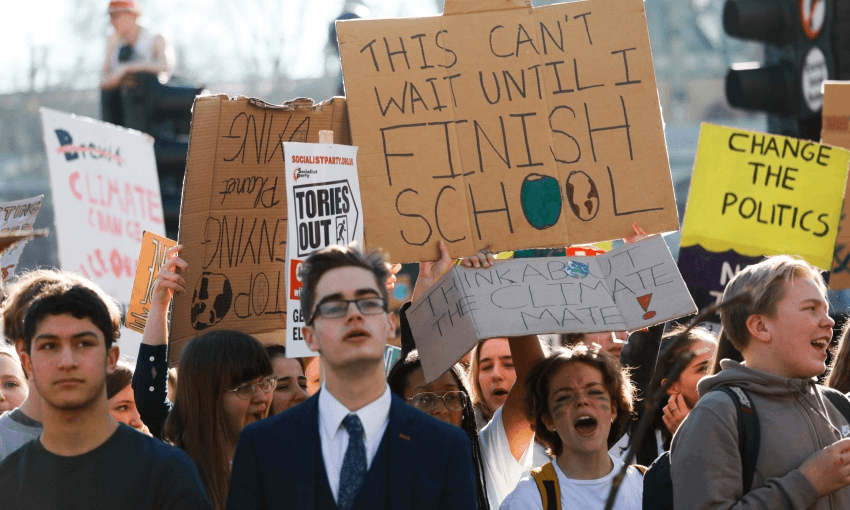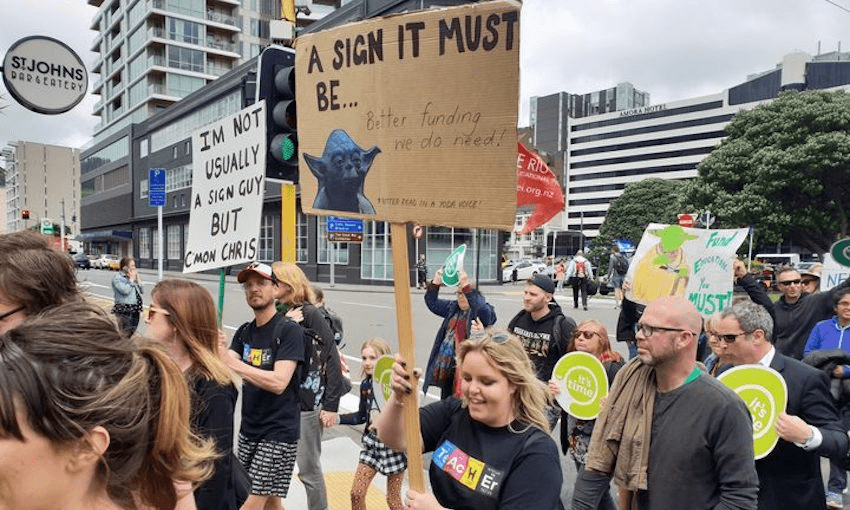As a generation, we will not be complicit in the death of the planet. This Friday’s climate strike is our way of showing that we can change the world, we can face down those who disregard and ignore us, and still come out on top, write Auckland secondary school students Grace Wilkie and Libby Morrison
As teenagers we are not yet old enough to vote, to have a say in who or what the government that will decide our future will be like. We are striking this week around the world because this is our first, last, and only resort in order to get those in power to listen. We are passionate, desperate, and backed by science and still we struggle to get the attention of those in charge. For that reason March 15 is more than just a day off school. It’s a strike for the future, a plea to the government and a show of strength and solidarity from the young people of Auckland and all over the globe.
The older generations that currently hold the power are making decisions that will affect us more so than them. For us, this is our nuclear-free movement. Climate change is our biggest threat, and people must acknowledge and do something about it. Those in power hold our future in clenched fists and we are asking that they let us breathe.
See also: Why I’m not striking
The issues that arise from climate change are catastrophic. According to the IPCC report, water levels will rise by 48 centimetres worldwide. That means 6% of insects, 8% of plants, and 4% of vertebrates would lose at least half their range (the area in which they thrive), and the overall yield and nutritional value of crops would decrease significantly. At 1.5 degrees, roughly 14% of the population will face more extreme heat, and 350 million more people will be affected by severe drought. After 30 years of inaction from the government and the society we live in, we are now forced to take a stand if we want to see humanity continue to live and survive the mass starvation forecasted in the next 10 years. Already we have watched our summers get hotter and longer, and it is not just our ice creams that will be melting faster.
This strike is our way of making our demands heard by the government and all of those in power. We demand:
- That they will take concrete action to limit global warming to no more than 1.5 degrees.
- That they will stop all exploration for fossil fuels (as we already have more in our reserves than we can afford to burn to avoid catastrophic climate change.)
- That they will regulate emissions from agriculture, which account for almost half of our emissions, and for which there is currently no plan.
To those who oppose us, we would like to say thank you. With such controversial and often disrespectful opinions and comments, you continue to allow our message to be heard. You talk about us as if all we’re doing is showing up, as if we haven’t spent most of our free time and effort on this strike. The number of students, all of whom have spent the past month organising this protest and speaking to all manner of people (principals, celebrities, politicians) is more than you may think. You have forced our hand and we are more than happy to unite to force a change, a change desperately needed for our survival.
You say that not enough children and teenagers are getting involved in politics, yet when we begin to get involved you tell us that we can’t change anything, that it’s not worth our time. This strike is our way of showing you that we can change the world, we can face down people like you, who disregard and ignore us, and still come out on top. Calling us childish, hiding behind online articles and belittling us to the media, could come across to some as almost childish and immature which is exactly what you’ve disregarded us for. Despite having more life experience, being older and often in positions of power, politicians and radio personalities seem to be lacking some of the typically ‘mature’ traits that the younger organisers of the protest have shown such as a diplomatic approach to conflicting ideas, consistent leadership skills, and the ability to rally people for pressing global issues.
Although we are young, we believe that we should have a say in how the world we will inherit is run. Missing a few periods of school is a worthwhile trade off to help save a planet. We have been raised to be the generation of change. We have grown up on the transition of a century, of the endless new developments in technology, and to be told we can not create change ourselves is laughable. This strike is about bringing public attention to what the true extent of climate change is, how harsh it is and how soon it will affect all of us. We have grown up with civil and international wars, our forests and homes being devastated by natural disasters spurred on by climate change, not to mention the destruction caused by unfettered consumerism.
As a generation, we will not be complicit in the death of the planet that has been treated so poorly before we even existed. We will draw the line here, and be on on the right side of history.









